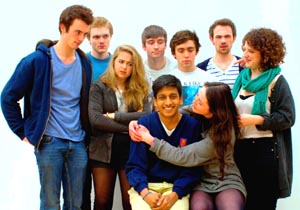This year’s Spring Revue was entitled Odds. That is ‘Odds’, period. A period enacts finality; it gestures hopefully towards a narrative arc gathering the Revue’s sketches into a coherent conclusion. What the Footlights offered was instead a series of slightly unfunny sketches that clunkily bordered a shared narrative without ever quite attaining it.
Arthur Moore (Nick Ricketts), a hapless recent widower, is in debt to the tune of one million pounds and fifty-six pence after spending precisely that lavish sum on his late wife’s funeral. His daughter, Jen (Hannah Phillips) is mildly distressed by her father’s profligacy, not to mention her mother dying. Enter Lindsay Sharpe (‘it’s a unisex name’), played by returning Footlight Raph Shirley, a morally bereft loan shark.
He’s a Soprano transcribed into an English mansion: he’ll lend Moore the money as long as he pays it back a week later (or he’ll break his kneecaps). He decides he fancies Jen, too. Also populating the stage were politician Nigel French (Mark Fiddaman), aka UKIP’s Nigel Farage, two boy scouts, Tom Pye and Ryan O’Sullivan and a Brown Owl (Jessie Wyld). The scouts, convinced without any contingent that Moore’s mansion was empty, were squatting; French acquires the West Wing after Moore has an uncomfortable gambling loss.
This was essentially a farce: these variant figures were linked by a common space, Moore’s house, but many transitions between scenes were clumsy. Moore’s utter astonishment at finding the Scouts in his house mirrored my confusion at finding them in the Revue.
Tom Pye offered some of the best physical comedy of the piece, and Jessie Wyld was suitably overbearing as Brown Owl. My issue is not with their performances, but rather with the slight fracture between the scouts and the family with whom they were living. By the end of the play, Jen and Ryan O’Sullivan’s girl-boy scout, were apparently besotted – when exactly this took place is mystifying.
Fiddaman’s performance as French/Farage was a stand-out: as he leered, cackled and smarmed it was clear that this was strong satirical writing.
On the other hand, one gaping chasm in the script was the presence of a strong female role. Wyld’s Brown Owl gyrated around Ricketts like a woman possessed. She was desperate – and she played it well – but this retrograde representation of female sexuality was slightly pathetic. Hannah Phillips as Jen was underused – she was merely the object for Lindsay Sharpe’s lines rather than possessing many of her own, which was a shame because glimmers of apposite comedic timing evidenced themselves periodically.
The use of film was executed with varying success. French’s political address was genuinely hilarious; the Connect Four skit was slightly painful. Unfortunately, the content was undermined by the execution: often, the audience sat for five to ten seconds before anything appeared on the screen. Once, after a faux-news bulletin the screen was recoiling up to the ceiling while the film was still being projected. Lighting cues were late. The production lacked polish.
Ultimately though, it was the writing that failed its actors. Moore and Jen were two-dimensional; Brown Owl was a hysterical stereotype; the boy scouts were dropped from a Smoker. Technically, it lacked finish: this was disappointing since they were such basic elements.
Fluffed lines punctuate first nights; technical inefficiency should not. The narrative arc culminated in a comedy of repetition as Moore found himself, yet again, mired in debt for the party he had thrown to celebrate escaping it. But even this neat repetition couldn’t quite connect the disparate strands of Odds.
